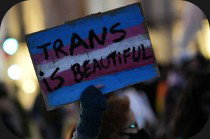
There’s a lot to celebrate in Christian worship services. Singing hymns, prayers, and the learning of God’s Word are all part of corporate worship, and I happily participate in that. I also participate in confession.
The Protestant tradition involves both a public and silent confession of sins. It’s an acknowledgement that we are sinful by nature, and have sinned by thought, word and deed. Through this confession and our earnest repentance, we seek and receive forgiveness through God’s grace.
I sin every single day. I don’t like that I sin but as a member of the human race, it is an inescapable truth with which we’re stuck. As the apostle Paul wrote to Christians in Rome, “All have sinned and fall short of the glory of God.” That includes me.
Rational people can agree that sin is bad, and I do not embrace my sin; I confess it and seek forgiveness. Jesus Christ said, “What comes out of a person is what defiles him,” so I reject any celebration of my sin.
But not all sins are treated equally. Increasingly, Protestant churches are celebrating sin through the installation of ministers whose behavior promotes LGBTQ ideology.
Consider this February 15th report whose headline heralds the “First openly transgender pastor called to guide Lutheran church in North Dakota.”
The pastor’s installation was unanimously approved by the congregation of the church, which has reportedly hosted town hall meetings to discuss, among other things, whether people should be forced to deny reality by calling women men, and vice versa; and whether children should be protected from genital mutilation. One can only speculate as to how those discussions will be steered.
The article goes on to quote the new pastor saying “Historically the church hasn’t been kind to transgender people. A lot of churches still aren’t kind to transgender people.” I do not know how the pastor defines what is kind or unkind but I do know that historically, the church has believed in the word of God as written in the Bible. A lot of churches still believe what is written in the Bible.
The behavior that defines LGBTQ ideology is sinful. That’s not my assessment, that’s what Christ said. He laid it out in the Gospel of Mark when He said, “Out of the heart of man, come evil thoughts, sexual immorality, theft, murder, adultery, coveting, wickedness, deceit, sensuality, envy, slander, pride, foolishness. All these evil things come from within, and they defile a person.”
Affirming and celebrating the behavior of LGBTQ adherents raises a question for Christians: If we’re going to celebrate this sin, what other sins are we prepared to celebrate? That’s a scary proposition and it’s already happening.
The sin of murder is celebrated through the increase of euthanasia. The sin of theft is celebrated through prosecutors who have decriminalized it through their failure to prosecute. The sins of coveting, envy and deceit are celebrated through Critical Race Theory. The sin of slander is celebrated hourly on cable news channels.
Components of Critical Race Theory are even creeping into conservative parishes today. Whether this portends churches celebrating the sins of CRT’s advocacy for race hatred or its alignment with Marxist ideology remains to be seen.
We all sin, and through confession, repentance and grace, God forgives us. We are also called to forgive those who sin against us. Whether these are sins of sexual immorality, envy, theft or anything else, our duty is to forgive others as God forgives us.
But forgiving sin is not the same as affirming it.
The Bible instructs us to love one another but it also tells us to abhor that which is evil. None of my sins should be celebrated; they should be abhorred. If any pastor in the pulpit affirmed or celebrated my sins, I would walk out in the middle of that sermon and find a better church. But more churches are celebrating more sins, and it’s a colossal moral and civic hazard.
If the North Dakota pastor has been harassed, threatened, assaulted or otherwise treated unkindly, that is flat out wrong. Likewise, the pastor is entitled to the full enjoyment of and participation in American civic life, and I would demand that any effort to prevent the free exercise of these rights be prosecuted to the fullest extent of the law.
But it is not unkind to believe what the Bible says. It is not unkind to call a sin a sin. It is not unkind to notice reality and natural law. These are normal behaviors. Just as I reject any affirmation of my sin, I reject any attempt to deny that which is normal and in accordance with Scripture.
In many cultures across time and space, the church has provided the moral bedrock of society. When churches celebrate sin, that bedrock crumbles and over time, so do the societies built upon it.
* Article from: Townhall
